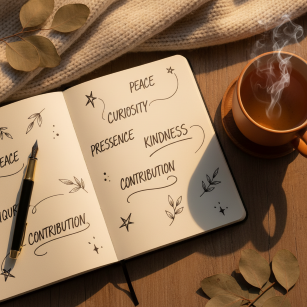A personal reflection on redefining success, slowing down, and finding peace in the quiet corners of growth.
1. The Weight of Traditional Metrics
For a long time, I believed progress could be counted. It looked like a straight line on a graph, a higher salary, bigger savings, more possessions, more recognition. I thought if the numbers were rising, so was I. That’s how the world had trained me to measure life, through promotions, profit margins, and milestones. Everything that could be quantified became the proof that I was moving forward.
But slowly, something strange began to happen. The higher the numbers went, the heavier I began to feel. It was as if every achievement added a little more pressure instead of peace. The satisfaction faded faster each time, like water slipping through my hands. I started to wonder, why does “more” never feel like enough?
When I dug into it, I discovered a concept called the hedonic treadmill in psychology. It means that as humans, we quickly adapt to new levels of success. What once thrilled us becomes the new normal, and soon we begin chasing the next level. The brain’s reward system, powered by dopamine, gets us hooked on the pursuit rather than the experience itself.
That’s why no matter how much we earn, we keep refreshing job listings, comparing salaries, or worrying about the next investment. It isn’t greed; it’s wiring. Our nervous system is tuned to survive through seeking. In ancient times, this helped us hunt and gather. But today, it traps us in endless wanting.

I remember sitting once after a long trading day, charts glowing, numbers running through my mind like a restless tide. I had made profit that week, yet the joy was fleeting. By nightfall, my heart was already planning the next win. I realized then that I wasn’t chasing success anymore; I was being chased by it.
Traditional progress metrics, income, speed, and status, had become a treadmill disguised as a staircase. Every step looked upward but led nowhere new. And when life feels like that, you don’t need to move faster. You need to pause.
2. The Hidden Metrics We Forget to Measure
When I began to pause, I noticed something strange. There were other kinds of progress happening quietly beneath the noise, softer, invisible kinds that I had never measured before. Things like peace, curiosity, attention, and kindness.
At first, they seemed too small to count. But they were the ones that actually made my life feel rich.
Psychologists often talk about subjective well-being, which is a fancy way of saying how you truly feel about your life. It’s not about how much you have, but about the quality of your daily emotions and thoughts. Studies show that once basic financial needs are met, happiness levels stop increasing much with income. What grows instead is anxiety, the fear of losing what we have or not keeping up with others.
But when you focus on these hidden metrics, something inside begins to heal.
Peace became my first real metric. Not peace as in silence or stillness, but the kind that lives beneath noise, the kind that makes you feel safe in your own skin. I began to ask myself, “Did today feel calm?” rather than “Did today look productive?”

Attention was another one. We live in a world designed to scatter it, social media, notifications, endless opinions. But attention is our life’s currency. Where it flows, our days go. The ability to stay with one thing, reading a page, watching the sunrise, talking to someone without glancing at the phone, became a quiet act of rebellion against chaos.
Curiosity became the third hidden metric. When I was younger, I learned things because they helped me get somewhere, a better grade, a better job, a better life. But when curiosity came back, I started learning for the joy of learning again. It brought back wonder, something adulthood had stolen.
These hidden metrics are harder to show off, but they are easier to live with. They restore balance to a mind exhausted from comparison. They don’t make noise, but they bring meaning.
If traditional success fills your calendar, hidden success fills your heart.
3. Designing Your Own Progress Dashboard
Once I began to see both kinds of metrics, I realized I needed a new kind of dashboard for my life.
We all have invisible dashboards running in our heads, little scoreboards that tell us how well we’re doing. The problem is, most of them were designed by society, not by us. So, we end up chasing someone else’s definition of progress. But what if we redesigned that dashboard consciously?
Here’s how I did it, and how you can too.
First, I sat down and asked myself, what truly matters to me when no one is watching? Not what looks impressive, but what feels alive.
My list came down to five simple measures:
- Peace of mind
- Presence in the moment
- Depth of relationships I had
- Curiosity for learning something new
- Contribution to something larger than myself, of much higher value.
These became my personal indicators of progress.
And to make them real, I began tracking them like I once tracked financial charts. Not in an obsessive way, but with gentle observation. Each night before bed, I’d ask myself questions like:
- Did I feel calm for at least part of today?
- Did I give someone my full attention?
- Did I learn something new that made me curious?
- Did I express gratitude or kindness to anyone?
- Did I take a small step toward something meaningful?
This reflection became a grounding ritual. It shifted my focus from outcome to experience and creating value for others.

Psychologically, this practice rewires your reward system. The brain starts associating progress not with dopamine spikes from achievement but with serotonin, the chemical of contentment, connection, and calm. You begin to feel fulfilled during the journey rather than only at the finish line.
If you’ve ever felt lost or unmotivated even when life looks successful, it might be because your inner dashboard and outer results are out of sync. The world measures “more.” Your soul measures “enough.” And sometimes, updating your inner dashboard is the first real step toward peace.
4. Why Slowing Down Might Be the Smartest Move
I used to think slowing down was failure. In the culture of hustle, every pause looks like falling behind. But the truth is, the human mind isn’t built for constant acceleration. When you move too fast for too long, your nervous system shifts into survival mode. Cortisol levels rise, focus drops, and joy becomes scarce.
Slowing down isn’t quitting; it’s recalibrating. It gives your mind a chance to process emotions, consolidate memories, and find clarity. When psychologists study creativity, they find that the best ideas often appear when the brain is in a relaxed, unfocused state, during a walk, a shower, or moments of quiet. This is known as the default mode network at work. In other words, slowing down actually makes you smarter and more self-aware.
I began practicing “deliberate slowness.” I’d do one thing at a time, eat without my phone, walk without music, talk without multitasking. At first, it felt unnatural. My brain craved stimulation, the constant rush of doing. But then something beautiful started happening: time expanded.
Moments became richer, thoughts clearer, emotions gentler. I realized that life was never rushing past me, I was the one rushing past it.

When I slowed down, I started to notice small joys that were invisible before: The way sunlight lands softly on your morning cup. The sound of your mother’s laughter in the next room. The quiet pride of finishing a task with presence rather than haste.
That’s when I understood, real progress isn’t about how fast you move, but how deeply you live.
5. The Psychology of Enough
Somewhere inside us all, there’s a fear of not enough. Not enough time, not enough success, not enough love.
Psychologists call this the scarcity mindset. It keeps the brain in a loop of anxiety, always scanning for what’s missing rather than appreciating what’s present. It’s the same mechanism that makes us check our bank balance over and over or compare our path to others.
But the mind also has the power to rewire this pattern. Gratitude, mindfulness, and reflection literally reshape neural circuits, they strengthen the prefrontal cortex, the part responsible for awareness and emotional regulation. Over time, they weaken the fear-based reactions of the amygdala.
When you start practicing “enoughness,” you aren’t giving up on ambition. You’re just choosing to grow from peace rather than from panic.
There’s a quiet power in waking up and whispering to yourself, “I have enough. I am enough. I’m doing enough for today.” This doesn’t mean life stops challenging you. It simply means you no longer measure your worth by the size of your struggle.
6. Healing Your Relationship With Progress
If you’ve been feeling lost lately, unsure whether you’re moving forward or just running in circles, you’re not alone. Many of us carry invisible exhaustion from years of chasing invisible targets. We scroll through success stories, compare our pace, and quietly ask ourselves, “Am I falling behind?”
But progress isn’t something you can see in real time. It’s more like emotional healing, invisible until one day you wake up calmer, wiser, lighter.
Growth hides in stillness. Progress often looks like rest. And sometimes, the most productive thing you can do is sit with yourself and breathe.
I began replacing goals like “earn more” with intentions like “live more happily.” Instead of asking “What do I need to gain?” I began asking “What do I need to release?” Releasing the need to prove. The habit of comparison. The belief that only visible progress counts.
That’s when I started to see myself clearly again, not as a worker, a trader, a performer or a creator but as a human being in the process of living a joyful and mindful life.
7. Redefining Success
If we stripped success of all its numbers, what would remain?
Perhaps it would look like a peaceful morning routine. A conversation that feels real. The courage to start over. The patience to listen. The ability to sleep at night with a calm heart.
Real success, I’ve learned, is not accumulation. It’s alignment. It’s when your inner world and outer actions begin to move in the same rhythm.
Maybe progress isn’t about reaching somewhere new. Maybe it’s about returning to yourself, the part that was always whole, but got buried under expectations.
8. A Gentle Invitation
If you’ve been feeling that your life’s metrics don’t match your soul’s truth, take a moment tonight. Sit in silence. Close your eyes. Ask yourself, “What does progress feel like to me?”
Don’t think about what it looks like. Feel it.
- Does it feel like calm?
- Like learning something new?
- Like being kind when it’s hard?
- Like forgiving yourself for being human?
Let those answers guide your new definition.
You don’t have to quit your dreams or reject ambition. Just let your ambition be rooted in awareness instead of overwhelming fear and anxiety. Let it grow from love, not fear. Let it expand gently, like light at dawn. And that’s when you’ll slowly start to notice that you are being chased by success too.

9. The Quiet Truth
There’s a truth I’ve come to believe deeply, real progress doesn’t rush. It moves like nature. Slowly, quietly, persistently. You may not notice it every day, but one day you’ll look back and realize how far you’ve come, not in miles or money, but in peace and overall quality of life.
You’ll see how the storms that once terrified you became the reason you grew. You’ll see how slowing down didn’t delay you; it brought you home. You’ll see that the person you were trying to become was always inside you, waiting for your attention.
And that’s when you’ll smile, not because you’ve reached the top, but because you’ve finally started living on your own terms. That, my friend, is the truest kind of progress.
If you ever feel lost, remember:
- Your value isn’t defined by how quickly you climb.
- It’s revealed by how deeply you feel, how kindly you live, and how peacefully you breathe.
- Money will always be a tool, never the destination.
And the moment you stop measuring life in numbers, you begin to live it in moments. That’s where real wealth begins.
A Gentle Note from MoneyHum
If these words found you in a moment of doubt or quiet exhaustion, take them as a small reminder that you are already moving in the right direction, even if it doesn’t always look like progress from the outside. Growth is rarely loud. It hides in your small acts of courage, your decision to rest, your willingness to keep learning when no one is watching.
At MoneyHum, we believe that real wealth is emotional as much as it is financial. It’s the freedom to slow down, to choose peace, to build a life that feels whole from the inside out. Our journey is to walk beside you as you create not just financial security, but emotional balance and clarity, a kind of abundance that lasts.
So before you close this page, take one deep breath. You’re doing better than you think. Keep learning. Keep growing gently. And remember, progress is still progress, even when it’s quiet.
If you’ve read this till the end, thank you❤️
With love,
Your Dearest Friend,
Chitraansh







